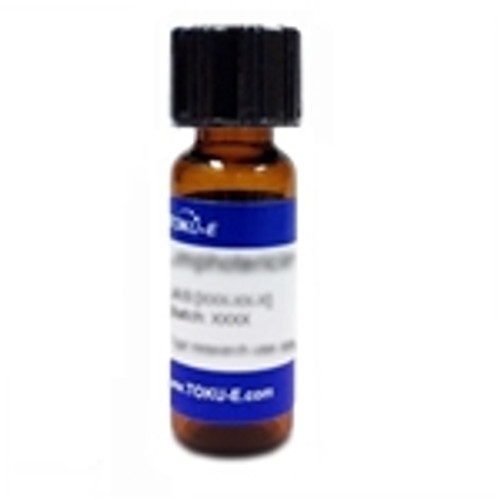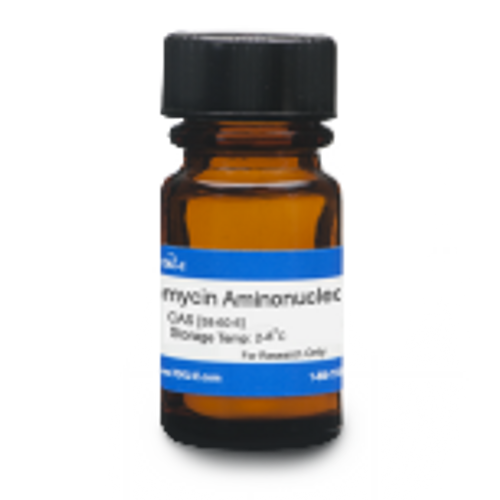Puromycin is an aminonucleoside antibiotic with anti-trypanosomal and antineoplastic properties. It was isolated from Streptomyces alboniger in the 1950s. Puromycin is used in cell biology to select for mammalian cell lines that have been transformed with the pac gene and express puromycin-N-acetyl-transferase. Puromycin is a reversible inhibitor of dipeptidyl-peptidase II (serine peptidase) and cytosol alanyl aminopeptidase (metallopeptidase). Puromycin has anti-cancer properties, inducing apoptosis in breast cancer cells. Puromycin is soluble in water, ethanol, methanol, DMSO and DMF.
We also offer:
- Puromycin Dihydrochloride (P001)
- Puromycin Aminonucleoside (P041)
- Puromycin DiHCl Solution (10 mg/ml in 20mM HEPES) (P025)
| Mechanism of Action | Puromycin is an analog of the 3’ end of a tyrosyl-tRNA, part of its structure mimics adenosine and the other part mimics tyrosine. The result is that it can block ribosomal translation both in vitro and in vivo. Puromycin can inhibit protein import into mitochondria during in vitro reactions by interfering with the ATP-dependent step of the import process. This can be used to study the protein import apparatus and identify the ATP-binding components of the apparatus. |
| Spectrum | Trypanocidal to protozoa belonging to the Trypanosomatina order. |
| Microbiology Applications | Puromycin can be used in mRNA display. This is a method to form a covalent linkage between a cell-free synthesized protein (phenotype) and its encoding mRNA (genotype) through Puromycin for in vitro selection of proteins. The method can be used to create molecules such as high-affinity therapeutic antibodies or peptides that bind to a desired target. Puromycin can be used in immunodetection as an alternative to radioactive amino acid labeling, allowing evaluation of translation in single cells by immunofluorescence microscopy. |
| Eukaryotic Cell Culture Applications | Puromycin is used as a selective agent in cell culture, resistance being conferred by the pac gene encoding PAC (puromycin N-acetyl-transferase). Recommended concentration in cell culture is 1-10 µg/ml, although it can be toxic to both eukaryotic and prokaryotic cells.
Puromycin was used as a selective agent in a CRISPR/Cas9 system to establish stable recombinant HEK293 cell lines for biopharma production. (Yang et al, 2019) |
| Cancer Applications | Puromycin induced apoptosis in MCF-7 breast cancer cells using an immunological assay to study apoptosis. There was still a non-negligible amount of synthesized protein. Puromycin at 0.5 ug/ml induced a high level of apoptosis in MCF-& breast cancer cells. Puromycin was compared with 2 other protein synthesis inhibitors (emetine, cycloheximide), each one inhibiting macromolecular synthesis via separate and distinct mechanisms (Soderlund et al, 2004). |
| Molecular Formula | C22H29N7O5 |
| Solubility | Puromycin is soluble in water, ethanol, methanol, DMSO and DMF. |
| References |
Mutonga et al. used Puromycin (TOKU-E) to select for resistant cells transformed with a vector containing SUV39H2 (a histone methyltransferase) and a Puromycin resistance gene. "Targeting suppressor of variegation 3-9 homologue 2 (SUV39H2) in acute lymphoblastic leukemia (ALL)." Nathans D., (1964) Puromycin inhibition of protein synthesis: incorporation of Puromycin into peptide chains. Proc. Nat. Acad. Sci. 51:585 Petska S. et al (1973) Effect of Puromycin analogues and other agents on peptidyl-puromycin synthesis on polyribosomes.. Antimicrob. Agents Chemother 4:37 Price J and Verner K (1993) Puromycin inhibits protein import into mitochondria by interfering with an intramitochondrial ATP-dependent reaction. Biochim. Biosphys. Acta 1150(1):89-97 Waller CWJ (1953) Achromycin, the structure of the antibiotic Puromycin. Am. Chem. Soc. 75: 2025. Vara J, Perez-Gonzalez JA and Jimenez A (1985) Biosynthesis of puromycin by Streptomyces alboniger: Characterization of puromycin N-acetyltransferase. Biochem. 24(27): 8074-8081 |






